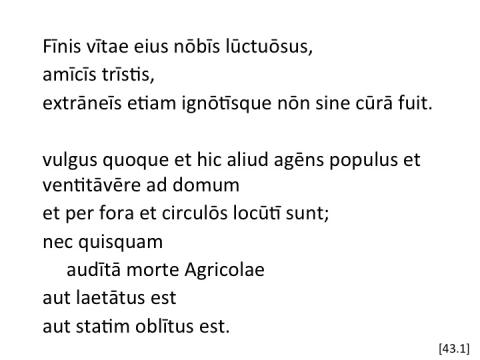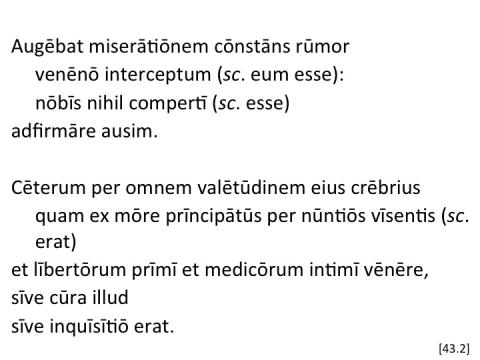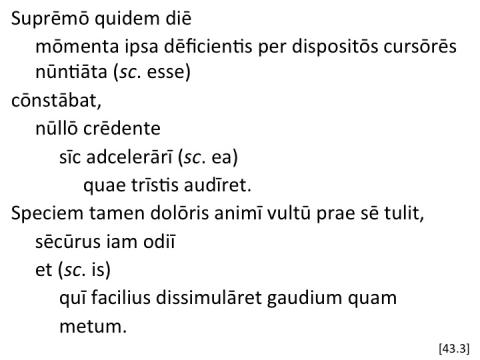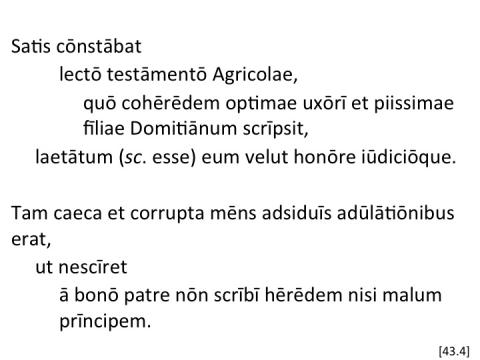Overview: The death of Agricola; he is universally mourned; suspicious circumstances attending his last hours; Domitian's reception of the news. (Stuart)
43.1
fīnis vītae: Agricola died in 93 CE. Three years or thereabouts elapsed between the last act of his public life, the relinquishment of the proconsulship, and his death. (Stuart)
extrāneīs: “outsiders”; nobis — amicis — extraneis — ignotis, mark a descending climax. (Gudeman)
etiam ... -que nōn = et ne quidem. (Gudeman)
ignōtīsque: "and not even to those who knew him not." In this active sense, for ignarus, the word is rare, but found ... occasionally in post-Augustan Latin. (Gudeman)
vulgus ... et populus: often joined by Tacitus — the common herd and the masses in contemptuous contrast with the official classes and the aristocracy. (Stuart); et adds a second term explanatory of the first, aliud agens, "busy with something else," i.e. "heedless." (Pearce); the collocation is frequent in Tacitus. populus often has a more or less political meaning; vulgus, on the other hand, is the people as viewed from the social or intellectual side — the ignorant rabble. (Gudeman) hīc: "this ... of ours." (Stuart)
circulōs: "social gatherings." (Stuart)
locūtī sunt: i.e. about Agricola's death. (Pearce)
laetātus est, etc.: on the collocatio verborum see Introd. p. xxvi #4. (Gudeman)
statim oblītus: a touch of worldly wisdom; his death was bound to be forgotten by the average person sometime, but he was not lost to memory at once. (Stuart)
43.2
augēbat: "but what increased ... was." On the emphatic position see Introd. p. xxvi #3. (Gudeman)
interceptum: sc. eum esse. (Damon); carries with it the idea of being cut off in the middle of his career before his natural time. (Stuart)
nōbīs nihil compertī: sc. esse. (Damon); nobis is emphatic and may refer to the whole family, as in 45.5. Tacitus speaks both for himself and his wife. Some prefer to regard it as an editorial plural. (Stuart)
adfirmāre ausim: "might hazard the statement that." Tacitus acknowledges that the family did not possess indubitable evidence to substantiate the rumor. However, in the next two sentences he contrives to leave with the reader the impression that Domitian was not innocent of wrong-doing. (Stuart)
cēterum: "passing on to the known facts." (Stuart); "but be this as it may," resumptive, as often. (Gudeman)
valētūdinem: "illness," the word being rarely used of health without some attributive, like bona, optima. (Gudeman)
ex mōre prīncipātūs: sc. erat. (Damon); we should say, "according to the fashion of royalty." The democratic Trajan used to call in person on sick friends. (Stuart); principum ... visentium, abstract for concrete, on which see note 16.3. (Gudeman)
lībertōrum prīmī: elsewhere in Tacitus the usual epithet of liberti or amici is intimi, here applied to the physicians. (Gudeman)
medicōrum intimī: "confidential physicians." (Stuart)
sīve cūra ... sīve inquīsītiō: Tacitus allows the reader to choose between the only two possible motives that would explain the interest displayed by Domitian. (Stuart) cūra: "solicitude." Observe the chiasmus, cura referring more particularly to medici, inquisitio to the liberti. (Gudeman) illud: notice that it is not attracted to cura. See note on 21.2, idque. The reason may be that illud is emphatically the subject, "that remarkable behaviour on his part." (Pearce)
43.3
suprēmō quidem diē: quidem implies a contrast between supposition and fact. (Stuart)
mōmenta: "crises." (Pearce); "stages." (Gudeman)
dispositōs cursōrēs: "relays of couriers," stationed at intervals along the road. Domitian must have been at his palace in the Alban hills, else relays would have been unnecessary. See 45.1. (Stuart)
nūntiāta: sc. esse. (Damon)
cōnstābat: the imperfect shifts the responsibility for this statement from the author, who was not present at the death of Agricola, to those who reported these details at the time. See note 38.1. (Gudeman)
nūllō crēdente, etc.: i.e. no one believing that tidings, if received with genuine sorrow, would be sought with such eager haste, the implication being that Domitian knew the cause of Agricola's illness, and desired to learn as quickly as possible whether the poison had done its deadly work. Thus Tacitus virtually expresses his private conviction that the charge, though it could not be directly brought home to the emperor, was substantially true. (Gudeman)
quae trīstis audīret: tristis is the emphatic word, "which he would be sad to hear." (Pearce)
speciem, etc.: in his countenance he exhibited what was to pass as an indication of sincere grief of heart. ... Species, in the sense of a sham pretext, as opposed to what is real and sincere, is common in all periods of the language. (Gudeman) speciem ... dolōris animī vultū ... tulit : doloris is dependent on speciem, animi on doloris, and vultu goes with tulit. The phrase contains an emendation for the manuscript's doloris animo vultuque. Other emendations are possible (see note below) and some editors retain the manuscript's reading, despite its odd meaning. (Damon) dolōris nimiī: "extravagant grief." (Stuart) vultū prae sē tulit: "he carried on his countenance a show of." (Stuart)
sēcūrus iam odiī: "free from concern now as to hatred." The object of his resentment being dead, Domitian was freed from the “incident to disguising his hate.” (Stuart); the genitive with securus is poetical. It depends on the noun-idea cura in the adjective. (Pearce); i.e. he was no longer troubled by the uneasiness caused by his animosity toward Agricola, and could now with complacency affect real sorrow.
et quī ... dissimulāret: an adjectival qui-clause co-ordinated with a preceding adjective is regularly in the consecutive subjunctive. (Pearce) [A&G 534-35] et quī: "being a man who," subjunctive of characteristic. (Gudeman)
43.4
cohērēdem: in order to avoid confiscation of his estate. (Stuart) cohērēdem ... scrīpsit: i.e. he sacrificed a part to save the rest. (Pearce)
optimae uxōrī et piissimae fīliae: an echo of the conventional phraseology of the will. (Stuart)
Domitiānum: the omission of an epithet is doubtless intended to heighten the contrast with the preceding laudatory superlatives. (Gudeman)
laetātum: sc. esse. (Damon)
honōre iūdiciōque: the latter word explains the former, "a distinction and mark of esteem." iudicium gets the meaning of a favourable judgement from its connection with honos. (Pearce)
bonō patre ... malum prīncipem: the antithesis is emphasized, as often, by alliteration. See Introd. p. xxviii #13. (Gudeman) nisi malum prīncipem: an exaggeration inspired by his animosity toward Domitian. (Stuart)




